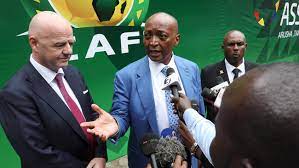August 11 – CAF president Patrice Motsepe has claimed that the Zambian FA withdrew a proposal to restructure the confederation’s executive committee and reduce operational costs after the reform plans did not make the agenda at the general assembly in Arusha, Tanzania.
“There was a notice that was circulated by Zambia,” said Motsepe. “Some of the issues that Kamanga (Andrew Kamanga, president of the Zambia FA) was raising there were very good issues because these are issues I have spoken about: the need to cut costs, and in his document he is talking about the need to restructure the exco. It is our duty to engage on those issues.”
The Zambia Football Association (FAZ) and Kamanga had formulated a proposal to reform the CAF executive committee in a bid to reduce the confederation’s operational costs and provide CAF with a leadership more representative of Africa as a whole.
However, the proposal was removed from the agenda by the body’s general secretary Veron Mosengo-Omba. At first, the proposal had been included in the draft of the agenda.
Motsepe’s assertion that the Zambians withdrew their CAF Congress agenda item, is in fact a liberal version of the sequence of events as the Zambians tried repeatedly to get their proposal included, even writing directly to Motsepe asking him to reinstate the agenda item and bring the debate before the CAF Congress last week.
It is at this point that Motsepe seems to have intervened wielding the iron fist of democracy.
“I asked the president of Zambia to come and see me. They came to see me and we all agreed that we were going to withdraw this item,” said Motsepe.
See: FIFA’s African apparatchiks keep CAF reform proposal from being circulated to MAs
Kamanga’s proposal was to reduce the number of CAF executive committee members as well as redesign the makeup with a more equal representation of Africa’s six zonal unions. FAZ wrote a letter to Motsepe after the proposal was not circulated to the CAF membership, arguing that the CAF secretariat ‘overstepped their mandate by excluding our mandate’. Motsepe did not respond to the letter.
“CAF sought legal advice because the advice from our lawyers was that if you want to change the CAF statutes you have to follow the process,” explained Motsepe. This runs contrary to the Zambian assertion that their proposal was well within the timelines and scope of submitting an agenda item, and even quoted the statutes in doing so.
“I thought that what they wanted to do was to have a discussion and not necessarily seek the amendment of the statutes. I have got no doubt in my mind that there is a need for a fundamental change of many of the articles in the CAF statutes.”
The Zambian letter to Motsepe clearly stated that it was a point for debate, though the obvious outcome of that debate could have been a move by the body of African football to push for reform. Motsepe and the CAF secretariat clearly denied African football that opportunity.
CAF insiders, who asked not to be named for fear of recrimination, say that the concerns of the CAF secretariat had very little to do with the impact on the statutes but rather the re-composition of the political hierarchy in Africa and the greater representation – and most likely unity – across the African confederation the proposal brought as it battled to put football for the whole continent in front of power and privilege for the few.
Contact the writer of this story at moc.l1751501263labto1751501263ofdlr1751501263owedi1751501263sni@n1751501263osloh1751501263cin.l1751501263uap1751501263 or moc.l1751501263labto1751501263ofdlr1751501263owedi1751501263sni@i1751501263tnuk.1751501263ardni1751501263mas1751501263

